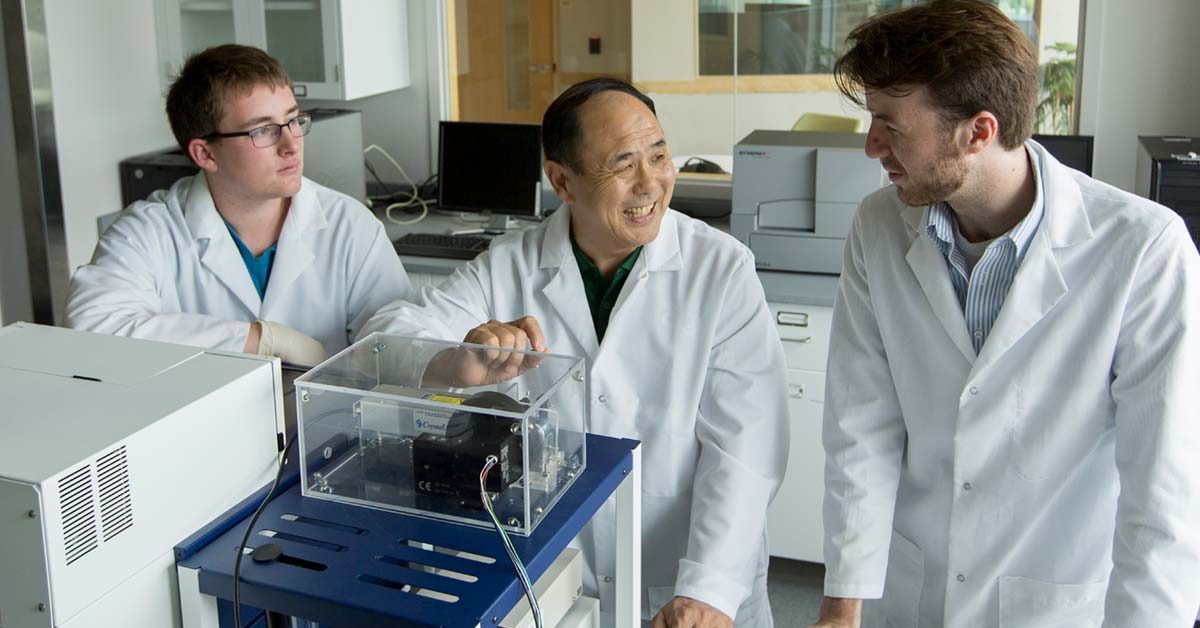Prevention with a capital ‘P’
Posted by magazine

Dr. Yinfa Ma (center), Casey Burton (right) and Alex Cristea (left) work with the P-scan devise which conducts a a rapid, point-of-care test for early screening of cancer that non-invasively monitors levels of pteridine biomarkers in urine. Photo by Sam O’Keefe/Missouri S&T
Technology detects cancer risks through urinalysis
The early detection of cancer through screening techniques such as mammograms saves thousands of lives annually. Yinfa Ma is out to save thousands more through an easier and less costly approach.
Innovative Approaches
Ma, Curators’ Distinguished Teaching Professor of chemistry and associate dean for research and external relations in the S&T College of Arts, Sciences, and Business, developed the “P-scan,” a fast, point-of-care method for checking urine samples for pteridine biomarkers. Ma’s research shows that higher levels of certain pteridine metabolites occur in urine samples from women who have been diagnosed with breast cancer.
“Cancer cells grow much faster than normal cells,” Ma explains, “so they release more waste into the urine and we begin to see a rise in certain metabolite levels.”
Last winter, Missouri S&T entered into an agreement with Cancer.im Inc. to commercialize the P-scan. Cancer.im is a Viratech Corp. company and social network for cancer patients, survivors and caretakers.
Ma hopes his invention will soon replace — or at least supplement — the mammogram for early detection of breast cancer. He also believes that the variety of biomarkers his device can identify could translate into screening for other types of cancer.
“The mammogram is not perfect,” Ma says. “Many early cancers cannot be detected by the mammogram, while other benign tumors are falsely detected. The P-Scan technology will help alleviate this problem by using molecular biomarkers in a detection method that can be easily integrated into a routine physical screening.
“A patient donates urine, and 10 minutes later she has a result,” Ma adds. “This will be an amazing diagnostic tool.”
How it works
The P-scan works by passing the urine through a small capillary and detecting the fluorescence given off by the pteridine biomarkers. The advantage of this technique is that it delivers excellent sensitivity without the need for costly instrumentation. The P-Scan can detect over 70 unique compounds in urine, many of which Ma believes may also be indicators of specific cancers. He hopes to study some of these compounds in future clinical trials.
Ma’s research suggests that two of these pteridine metabolites, “isoxanthopterin” and “xanthopterin,” were elevated in the urine of women with newly diagnosed breast cancer. New clinical trials are underway at Missouri S&T to verify these findings and to test whether pteridine biomarkers can be used to detect other types of cancers.
“We will go cancer by cancer until we know,” Ma says.
The National Cancer Institute estimates that over 1.6 million people will be diagnosed with cancer this year. Nearly one in eight women will develop invasive breast cancer during her lifetime. Around 85 percent of women diagnosed with breast cancer have no family history of the disease.
“I am very excited about this project,” Ma says. “It will save lives. That’s my motivation.”